Withdrawal refers to the constellation of physical and mental symptoms people experience after the sudden stoppage of prolonged and heavy substance use, such as alcohol and prescription or recreational drugs. It is also known as detox or detoxification.
What Is Withdrawal?
Withdrawal, also known as detox or withdrawal syndrome, is the psychological and physical effects experienced by people trying to stop or reduce substance and/or alcohol use, especially during treatment for addiction. As substances, such as recreational drugs, medications and alcohol, can lead to dependence, an individual can go through different symptoms when withdrawing from or discontinuing the use of such substances.
Consulting a healthcare professional is important before stopping substance use as withdrawal can have severe adverse effects. Researchers [mfn] Gupta M, Gokarakonda SB, Attia FN. Withdrawal Syndromes. [Updated 2020 Nov 1]. In: StatPearls [Internet]. Treasure Island (FL): StatPearls Publishing; 2021 Jan-. Available from: https://www.ncbi.nlm.nih.gov/books/NBK459239/ [/mfn] explain that as our body tries to maintain homeostasis, “when a substance is removed from the body, the residual counter-regulatory mechanisms produce unopposed effects,” and cause withdrawal symptoms.
When a person has been consuming a substance with a high potential for weeks, months, or years, he/she may have developed a strong physical or psychological dependence or both on a drug. Similarly, if the person suddenly and abruptly stops the consumption or drastically reduces the intake, it causes various emotional and physical symptoms ranging from mild to severe. Withdrawal is considered the clinical manifestation of this specific condition.
Understanding Withdrawal
Research [mfn] Shah M, Huecker MR. Opioid Withdrawal. [Updated 2021 Apr 19]. In: StatPearls [Internet]. Treasure Island (FL): StatPearls Publishing; 2021 Jan-. Available from: https://www.ncbi.nlm.nih.gov/books/NBK526012/ [/mfn] shows that this syndrome is a “life-threatening condition” caused by substance dependence and occurs after “intentional or unintentional abrupt cessation [mfn] Jesse, S., Bråthen, G., Ferrara, M., Keindl, M., Ben-Menachem, E., Tanasescu, R., Brodtkorb, E., Hillbom, M., Leone, M. A., & Ludolph, A. C. (2017). Alcohol withdrawal syndrome: mechanisms, manifestations, and management. Acta neurologica Scandinavica, 135(1), 4–16. https://doi.org/10.1111/ane.12671 [/mfn] ” of constant and heavy consumption in people suffering from substance addiction. A recent 2020 study suggests that the symptoms are relieved immediately after consuming additional alcohol or drugs. “
The signs and symptoms of alcohol withdrawal may range from a simple tremor to a fully blown delirium tremens characterized by autonomic hyperactivity, tachypnea, hyperthermia, and diaphoresis”, add the researchers. This study suggests that the intensity and duration of the symptoms largely depend on certain factors, such as:
- Type of drugs
- Duration of consumption
- Duration of action
- Person’s age and physical health
- Person’s psychological characteristics
- Withdrawal process
The process can be intense as well as unpleasant and sometimes potentially harmful as the symptoms can be fatal at their most extreme. One should consult with a health professional before stopping or reducing their consumption of the substance.
If you drink or use any drug once in a while, you are not likely to experience any of the physical or psychological symptoms after the sudden stoppage. The longer the substance is used and the more potent it is, the risk for such symptoms increases because of the more intense physical and psychological dependence.
1. Physical dependence
It refers to the condition when you have used a substance for a while and it leads to your body starting to rely on it to feel normal. Your body is slowly getting habituated to function with the drug in your system. That’s why the symptoms will start to occur if the substance isn’t taken or used.
2. Psychological dependence
It happens when people start to believe that they need a specific substance to function. One might believe that they need it for a specific situation or it could be for all the time.
Withdrawal And Craving
The concept of craving is closely associated with the withdrawal process of any substance use. A 2014 research paper explains [mfn] Northrup, T. F., Stotts, A. L., Green, C., Potter, J. S., Marino, E. N., Walker, R., Weiss, R. D., & Trivedi, M. (2015). Opioid withdrawal, craving, and use during and after outpatient buprenorphine stabilization and taper: a discrete survival and growth mixture model. Addictive behaviors, 41, 20–28. https://doi.org/10.1016/j.addbeh.2014.09.021 [/mfn] , “Craving and withdrawal, appear to be distinct, yet related, phenomena.” It says that craving occurs whenever the human brain learns that the easiest and quickest way to feel normal and comfortable is by using that substance.
The human brain starts to consider this way to deal with any kind of problem. Cravings are not a long-term phenomenon in this regard; rather they may occasionally appear, people can experience it even after many years they have stopped using. One needs to manage their cravings as they can be weak as well as strong. Distraction techniques such as watching movies, meditating, or exercising can be very beneficial in managing such cravings.
Symptoms Of Withdrawal
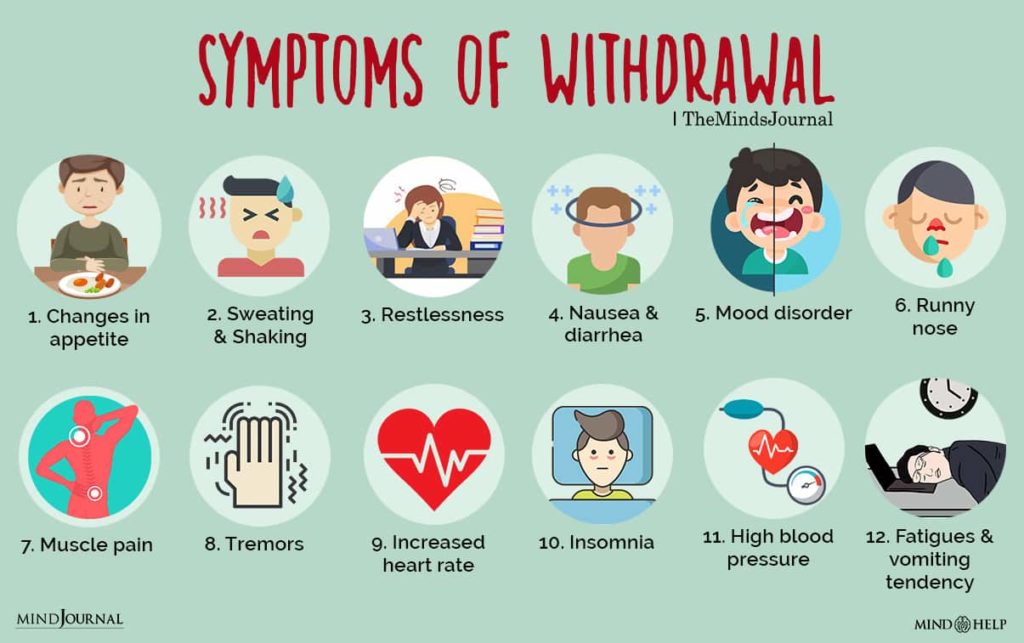
People can experience various changes in their body along with a range of physical and emotional symptoms from minor to serious. The signs and symptoms vary between people and the substance used. These may appear from six hours to a few days after the last consumption. Some common symptoms associated with withdrawal include:
- Changes in appetite [mfn] Hesse, M., & Thylstrup, B. (2013). Time-course of the DSM-5 cannabis withdrawal symptoms in poly-substance abusers. BMC psychiatry, 13, 258. https://doi.org/10.1186/1471-244X-13-258 [/mfn]
- Sweating [mfn] Mirijello, A., D’Angelo, C., Ferrulli, A., Vassallo, G., Antonelli, M., Caputo, F., Leggio, L., Gasbarrini, A., & Addolorato, G. (2015). Identification and management of alcohol withdrawal syndrome. Drugs, 75(4), 353–365. https://doi.org/10.1007/s40265-015-0358-1 [/mfn] and shaking
- Restlessness
- Nausea and diarrhea
- Mood disorder [mfn] Quello, S. B., Brady, K. T., & Sonne, S. C. (2005). Mood disorders and substance use disorder: a complex comorbidity. Science & practice perspectives, 3(1), 13–21. https://doi.org/10.1151/spp053113 [/mfn]
- Runny nose
- Muscle pain [mfn] Center for Substance Abuse Treatment. Detoxification and Substance Abuse Treatment. Rockville (MD): Substance Abuse and Mental Health Services Administration (US); 2006. (Treatment Improvement Protocol (TIP) Series, No. 45.) 4 Physical Detoxification Services for Withdrawal From Specific Substances. Available from: https://www.ncbi.nlm.nih.gov/books/NBK64116/ [/mfn]
- Tremors [mfn] Mirijello, A., D’Angelo, C., Ferrulli, A., Vassallo, G., Antonelli, M., Caputo, F., Leggio, L., Gasbarrini, A., & Addolorato, G. (2015). Identification and management of alcohol withdrawal syndrome. Drugs, 75(4), 353–365. https://doi.org/10.1007/s40265-015-0358-1 [/mfn]
- Increased heart rate
- Insomnia [mfn] Brower, K. J., & Perron, B. E. (2010). Prevalence and correlates of withdrawal-related insomnia among adults with alcohol dependence: results from a national survey. The American journal on addictions, 19(3), 238–244. https://doi.org/10.1111/j.1521-0391.2010.00035.x [/mfn] , nightmares, and other sleep disorders
- High blood pressure [mfn] Mirijello, A., D’Angelo, C., Ferrulli, A., Vassallo, G., Antonelli, M., Caputo, F., Leggio, L., Gasbarrini, A., & Addolorato, G. (2015). Identification and management of alcohol withdrawal syndrome. Drugs, 75(4), 353–365. https://doi.org/10.1007/s40265-015-0358-1 [/mfn]
- Fatigues and vomiting tendency
A 2018 research paper [mfn] Grover, S., & Ghosh, A. (2018). Delirium Tremens: Assessment and Management. Journal of clinical and experimental hepatology, 8(4), 460–470. https://doi.org/10.1016/j.jceh.2018.04.012 [/mfn] suggests that except for these commonly observed symptoms, people can experience certain severe effects also in some instances, such as hallucinations, seizures, and delirium. The study further explains, “Delirium Tremens presents with a combination of severe alcohol withdrawal symptoms and symptoms of delirium with agitation and sometimes hallucination.” The type of the substance, the amount of dosage, and the amount of time it takes to affect the body contribute to the severity of the symptoms.
Read More About Insomnia Here
Causes Of Withdrawal
The signs and symptoms appear when the substance usage is suddenly stopped or decreased. The human brain and the body work as a team to maintain a state of balance in a process named homeostasis. A recent 2020 study [mfn] Billman G. E. (2020). Homeostasis: The Underappreciated and Far Too Often Ignored Central Organizing Principle of Physiology. Frontiers in physiology, 11, 200. https://doi.org/10.3389/fphys.2020.00200 [/mfn] defines homeostasis as a self-regulating process by which our biological systems maintain stability when adjusting to changing external conditions. Research [mfn] Jesse, S., Bråthen, G., Ferrara, M., Keindl, M., Ben-Menachem, E., Tanasescu, R., Brodtkorb, E., Hillbom, M., Leone, M. A., & Ludolph, A. C. (2017). Alcohol withdrawal syndrome: mechanisms, manifestations, and management. Acta neurologica Scandinavica, 135(1), 4–16. https://doi.org/10.1111/ane.12671 [/mfn] says that consumption of any substance often changes the balance of homeostasis and makes our body take actions to adjust to the changing of certain neurotransmitters.
A 2009 research paper [mfn] Conner, K. R., Pinquart, M., & Gamble, S. A. (2009). Meta-analysis of depression and substance use among individuals with alcohol use disorders. Journal of substance abuse treatment, 37(2), 127–137. https://doi.org/10.1016/j.jsat.2008.11.007 [/mfn] claims that alcohol and drugs have a depressive effect on our body system including the nervous system and the brain. It reduces the functioning capability of our brain and changes the ways our nervous system transmits messages or signals back and forth. Studies [mfn] Clinical Guidelines for Withdrawal Management and Treatment of Drug Dependence in Closed Settings. Geneva: World Health Organization; 2009. 4, Withdrawal Management. Available from: https://www.ncbi.nlm.nih.gov/books/NBK310652/ [/mfn] have shown that our central nervous system adjusts its functioning with the substance molecules in our body that tries to keep our brain in an awakened state.
When the substance usage abruptly drops or stops, being an adaptive organ, our brain continues to stay in that awakened state which leads to certain withdrawal symptoms. Those symptoms can be psychological or physical and potentially harmful depending on the type of substance. These signs and symptoms often act exactly the opposite of the effects of the substance.
Duration Of Withdrawal
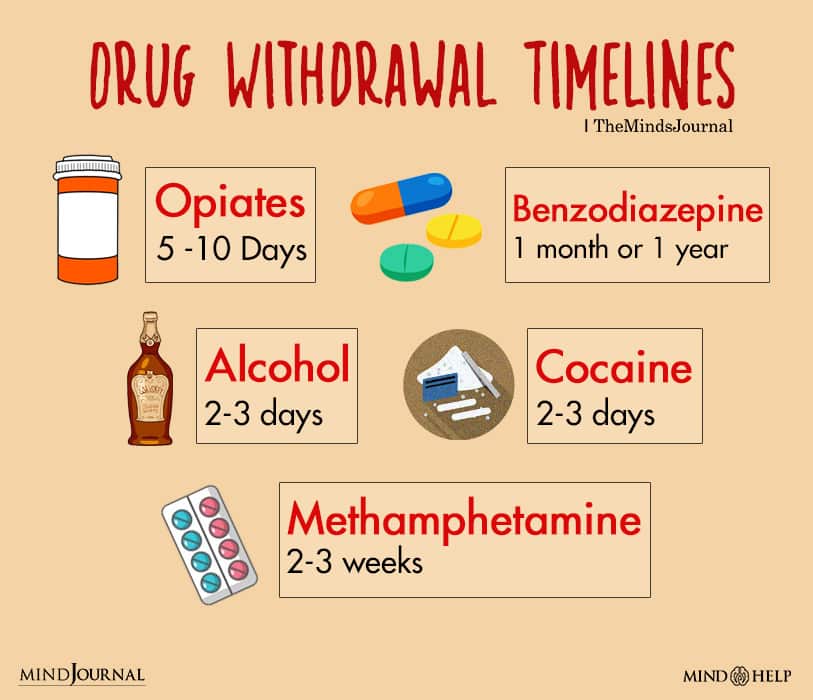
The symptoms start to appear after the active substance molecules are cleared from the body system. The duration of the symptoms primarily depends on the types of drugs people consume. It generally lasts from a few days to a few weeks, even for a month in some instances. Here are some common types of drugs that can result in withdrawal and their lasting duration:
1.Opiates
Opiates [mfn] Ling, W., & Wesson, D. R. (1990). Drugs of abuse–opiates. The Western journal of medicine, 152(5), 565–572. [/mfn] refer to a kind of substance that is used to treat pain. These are made from opium and cause intense sleep. These drugs act as a pain-killer and cause withdrawal symptoms that last for 5-10 days.
2. Benzodiazepine
It is often known as a tranquilizer and is mostly prescribed to treat anxiety. This drug is considered effective in treating some other psychological conditions also. The symptoms caused by benzodiazepine [mfn] Kang M, Galuska MA, Ghassemzadeh S. Benzodiazepine Toxicity. [Updated 2020 Nov 15]. In: StatPearls [Internet]. Treasure Island (FL): StatPearls Publishing; 2021 Jan-. Available from: https://www.ncbi.nlm.nih.gov/books/NBK482238/ [/mfn] last for a month or a year.
3. Alcohol
Alcohol [mfn] Saitz R. (1998). Introduction to alcohol withdrawal. Alcohol health and research world, 22(1), 5–12. [/mfn] involves a depressive effect on the human brain that leads to the symptoms lasting for 2-3 days.
Read More About Alcoholism Here
4. Cocaine
Cocaine [mfn] Ahmadi, J., Kampman, K., Dackis, C., Sparkman, T., & Pettinati, H. (2008). Cocaine withdrawal symptoms identify “Type B” cocaine-dependent patients. The American journal on addictions, 17(1), 60–64. https://doi.org/10.1080/10550490701755999 [/mfn] refers to a strong addictive stimulant that is made from the leaves of the coca plant. It can have a serious impact on people’s physical and psychological health. The symptoms caused by cocaine last for 7-10 days.
5. Methamphetamine
It is considered as a powerful highly addictive stimulant and affects our central nervous system. It is mostly recommended by health professionals to treat attention deficit hyperactivity disorder (ADHD). Methamphetamine [mfn] Zorick, T., Nestor, L., Miotto, K., Sugar, C., Hellemann, G., Scanlon, G., Rawson, R., & London, E. D. (2010). Withdrawal symptoms in abstinent methamphetamine-dependent subjects. Addiction (Abingdon, England), 105(10), 1809–1818. https://doi.org/10.1111/j.1360-0443.2010.03066.x [/mfn] causes certain withdrawal symptoms that last for 2-3 weeks.
Diagnosis Of Withdrawal Symptoms
When thinking about cutting on your addiction, it is crucial that you consult a doctor first. They can help you approach the process safely and reduce the potential symptoms. A doctor will review your medical history and ask you about certain things such as your addiction history, the symptoms you are experiencing, prior experience of any mental illness etc.
They may also recommend a physical examination to determine whether the symptoms are occurring due to withdrawal or some other underlying conditions. Except for this, you may undergo a toxicology screen test that detects how much alcohol is in your body. According to a 2017 study [mfn] Knight, E., & Lappalainen, L. (2017). Clinical Institute Withdrawal Assessment for Alcohol-Revised might be an unreliable tool in the management of alcohol withdrawal. Canadian family physician Medecin de famille canadien, 63(9), 691–695. [/mfn], Clinical Institute Withdrawal Assessment for Alcohol offers a scale of symptoms to measure the severity. The scale includes:
- Hand tremors
- Irregular heart rate
- Auditory disturbance
- Dehydration
- Fever
- Headache
- Nausea and vomiting
- Uncontrollable sweat
- Agitation
- Visual disturbance
Treatments For Withdrawal
Treatments for the withdrawal symptoms largely depend on the severity of the symptoms. The treatment process involves care, support, therapy and medications that can reduce the negative effects of the symptoms and prevent any kind of possible health complications. Research [mfn] Kattimani, S., & Bharadwaj, B. (2013). Clinical management of alcohol withdrawal: A systematic review. Industrial psychiatry journal, 22(2), 100–108. https://doi.org/10.4103/0972-6748.132914 [/mfn] says if a person doesn’t have any serious signs, they don’t need more than a supportive environment to cope with the psychological and physical effects. A supportive environment may typically include –
- Soft lighting
- Happy music
- Quiet and peaceful place
- Being around family and close friends
- Limited contacts with outside people
- Positive atmosphere
- Proper nutritious diet and hydration
However, certain severe symptoms cause extreme difficulties for people and require immediate treatments. Here are the different types of withdrawal treatments:
Types Of Withdrawal Treatment
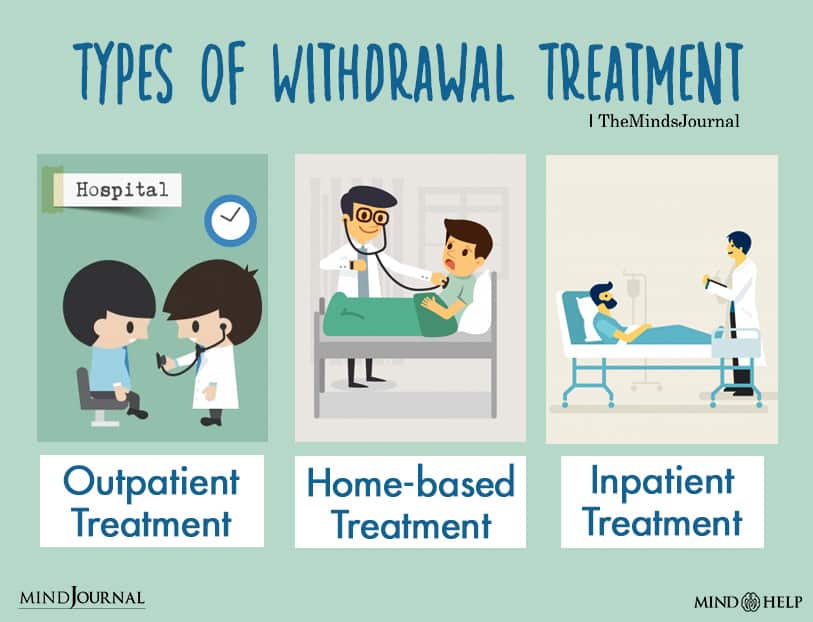
One needs a supportive environment during the withdrawal process. A doctor or health care professional can suggest or recommend the best setting for one after verifying their biological and emotional condition. The following are the three most common and widely used withdrawal process:
1. Outpatient treatment
This kind of treatment doesn’t require a person to get admitted to a residential unit. A 2013 research paper [mfn] Muncie, H. L., Jr, Yasinian, Y., & Oge’, L. (2013). Outpatient management of alcohol withdrawal syndrome. American family physician, 88(9), 589–595. [/mfn] explains that this option is appropriate for those who don’t want to get admitted to residential services. This process includes personal consultation sessions with a health professional for a short period as well as ongoing counseling and support. One can continue their family or work responsibilities along with their treatment.
2. Home-based treatment
Mild symptoms are often treated at home. This treatment is usually provided by a health specialist, a nurse, and a support person like a family member or a close friend. It is considered the best choice for those whose symptoms are not complicated.
3. Inpatient treatment
Inpatient withdrawal treatment [mfn] Myrick, H., & Anton, R. F. (1998). Treatment of alcohol withdrawal. Alcohol health and research world, 22(1), 38–43. [/mfn] , also known as residential treatment, requires the person to get admitted to a residential unit or hospital for 5-10 days. The health professionals help the person to cope with symptoms and avoid relapse later. Some residential hospitals may not allow the patient to contact their family or friends during the treatment. It also prevents that person from those people who use or consume drugs as it may lead to craving.
4. Medication
A 2015 research paper [mfn] Sachdeva, A., Choudhary, M., & Chandra, M. (2015). Alcohol Withdrawal Syndrome: Benzodiazepines and Beyond. Journal of clinical and diagnostic research : JCDR, 9(9), VE01–VE07. https://doi.org/10.7860/JCDR/2015/13407.6538 [/mfn] mentions that doctors often prescribe sedatives called benzodiazepines to reduce the severity of the symptoms. Some commonly prescribed medications are:
- Valium (diazepam)
- Catapres (clonidine)
- Xanax (alprazolam)
- Methadone
- Librium (chlordiazepoxide)
The other medications that are prescribed to manage the symptoms include anti-anxiety, antipsychotic, anticonvulsant, and other medications that are designed to treat nausea or sleeping difficulties.
Coping Strategies For Withdrawal
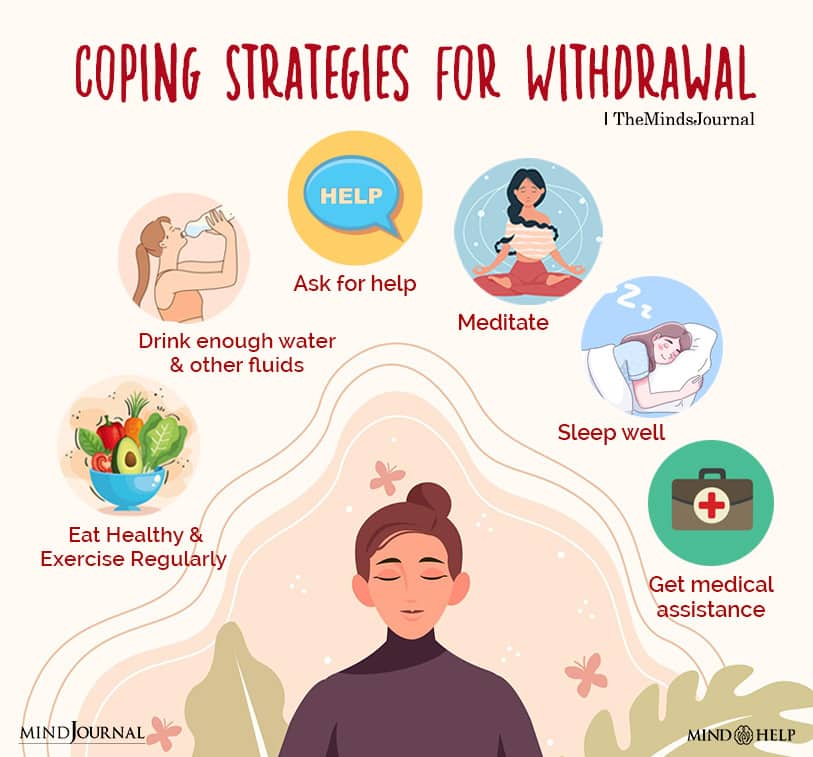
Along with these medical treatments, some coping strategies can help one to deal with the symptoms more effectively. The following coping tips may help one to feel better during their withdrawal symptoms:
1. Eat healthy and exercise regularly
Consume nutritious and well-balanced meals. Fried, fatty and sugary foods may make you feel worse during your treatment. Try to exercise each day as it can boost your mood.
2. Drink enough water and other fluids
Drinking plenty of water and other fluids with electrolytes is extremely important to stay hydrated during the process. It provides numerous benefits if you are experiencing nausea or vomiting.
3. Ask for help
It is important to have social support when you deal with the process on your own. Ask for help from a trusted family member or friend so that they can support you during the treatment process.
4. Sleep well
Withdrawal often causes various sleeping difficulties ranging from insomnia to nightmares. Though it is quite difficult to have a sound sleep, try to get an adequate amount of rest regularly. Establishing a sleep schedule may help you regarding this issue.
5. Meditate
Studies [mfn] Priddy, S. E., Howard, M. O., Hanley, A. W., Riquino, M. R., Friberg-Felsted, K., & Garland, E. L. (2018). Mindfulness meditation in the treatment of substance use disorders and preventing future relapse: neurocognitive mechanisms and clinical implications. Substance abuse and rehabilitation, 9, 103–114. https://doi.org/10.2147/SAR.S145201 [/mfn] have shown that mindfulness meditation keeps one stay balanced and relaxed during the process. It clears the mind and allows it to focus on what matters. It helps a person to get out of a reactive state and put into a proactive state.
6. Get medical assistance
If the common coping strategies are not working, one needs to seek medical help from a health care professional immediately. Otherwise, the symptoms can become severe and lead to delirium tremens which is the extreme condition some people experience during the treatment process.
Overcome The Effects Of Withdrawal
Most people who experience the withdrawal symptoms recover fully. If a person stops or reduces their substance usage and gets proper treatment immediately, it often leads to a beneficial outcome. But certain side effects such as sleeping disturbance, nausea, fatigue, vomiting tendency, and irritability may continue for months even after the treatment.
It can be life-threatening only when it involves advanced delirium tremens. In such cases, people should consult with a doctor immediately as the sooner one starts the treatment, the better their chances are of preventing fatal conditions.
Withdrawal At A Glance
- Withdrawal is the constellation of physical and mental symptoms people experience after the sudden stoppage of prolonged and heavy substance use.
- Consulting a healthcare professional is important before stopping substance use as withdrawal can have severe adverse effects.
- People can experience various changes in their body along with a range of physical and emotional symptoms from minor to serious.
- The signs and symptoms appear when the substance usage is suddenly stopped or decreased.
- It generally lasts from a few days to a few weeks, even for a month in some instances.
- The treatment process involves care, support, therapy and medications that can reduce the negative effects of the symptoms
- Most people who experience the withdrawal symptoms recover fully.
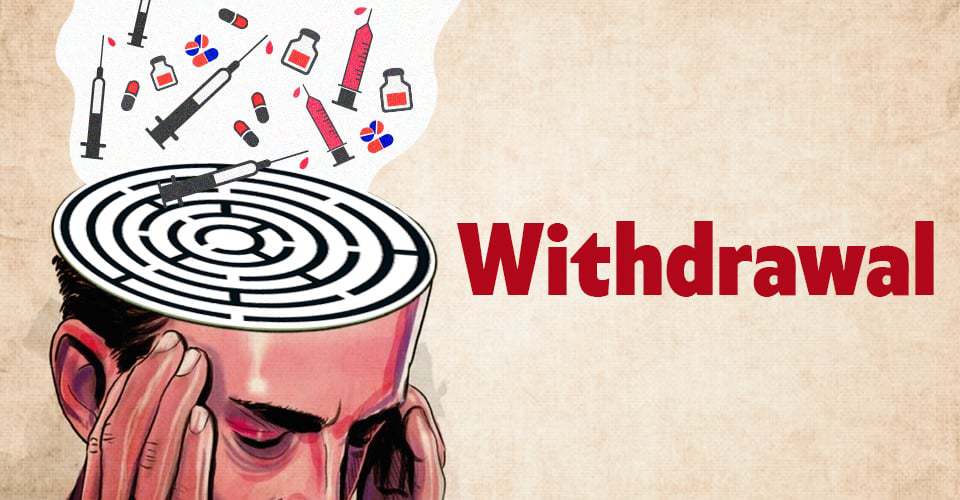
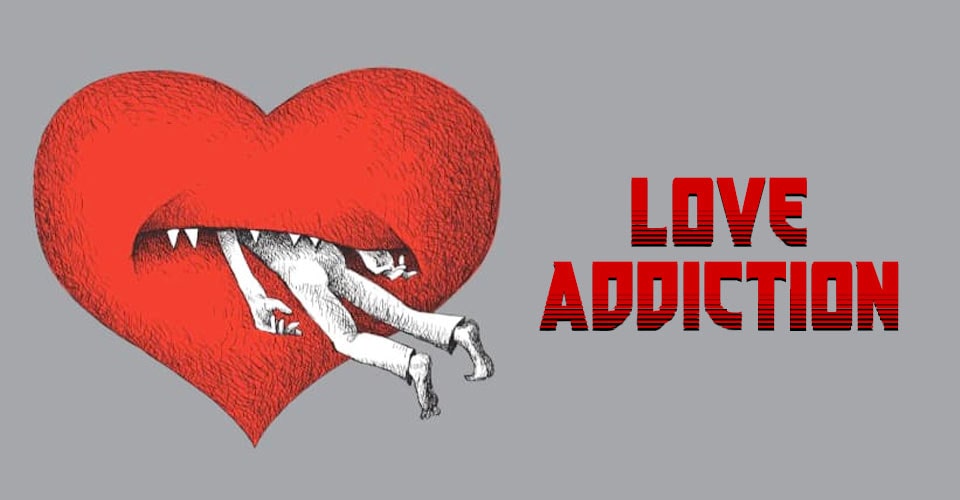
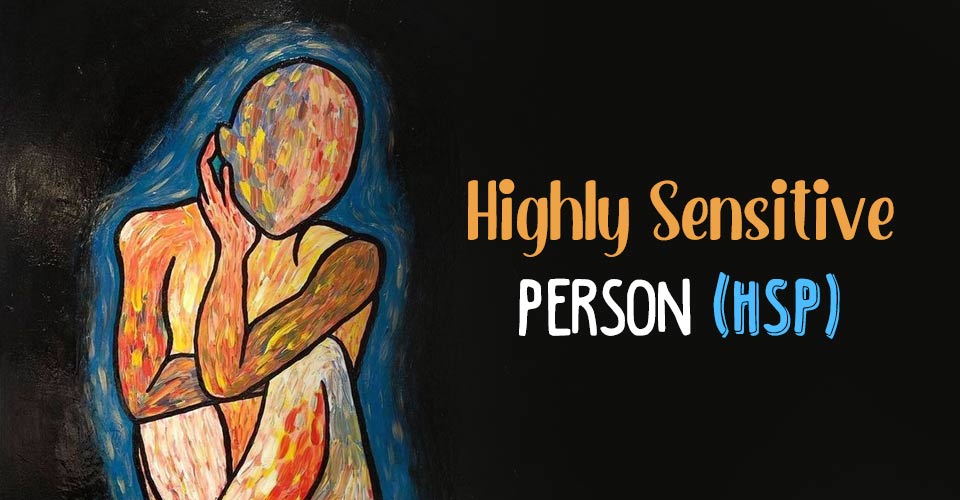

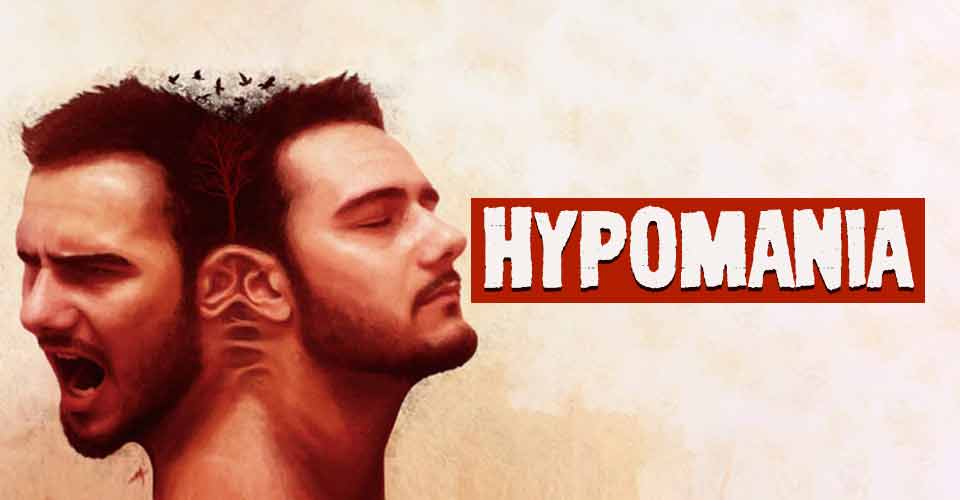



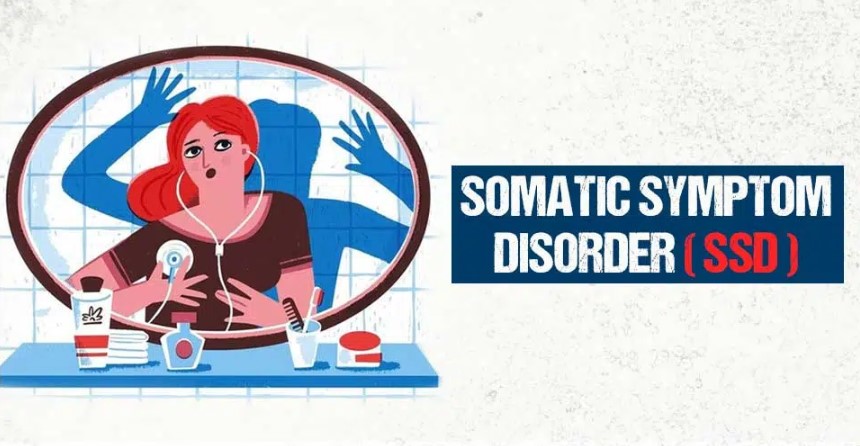

Leave a Reply